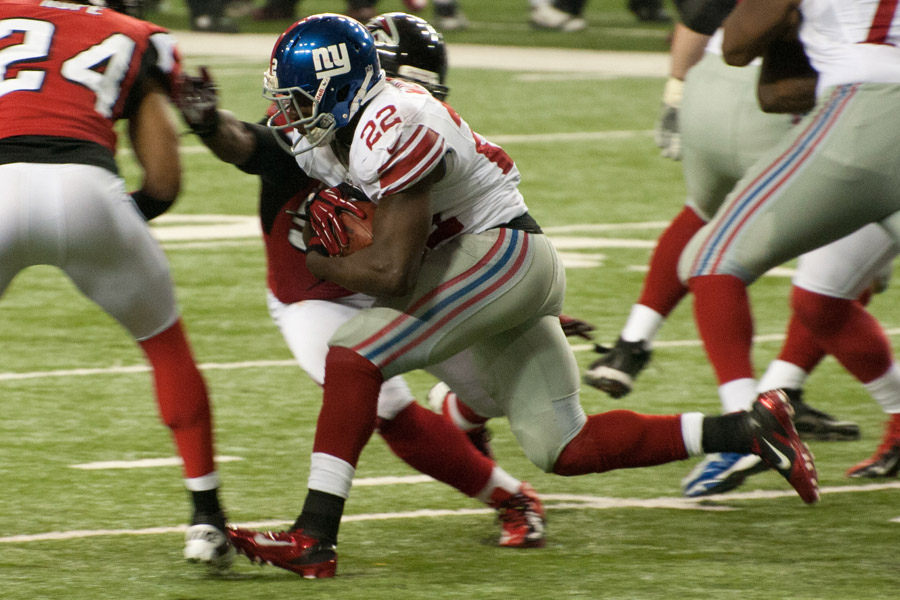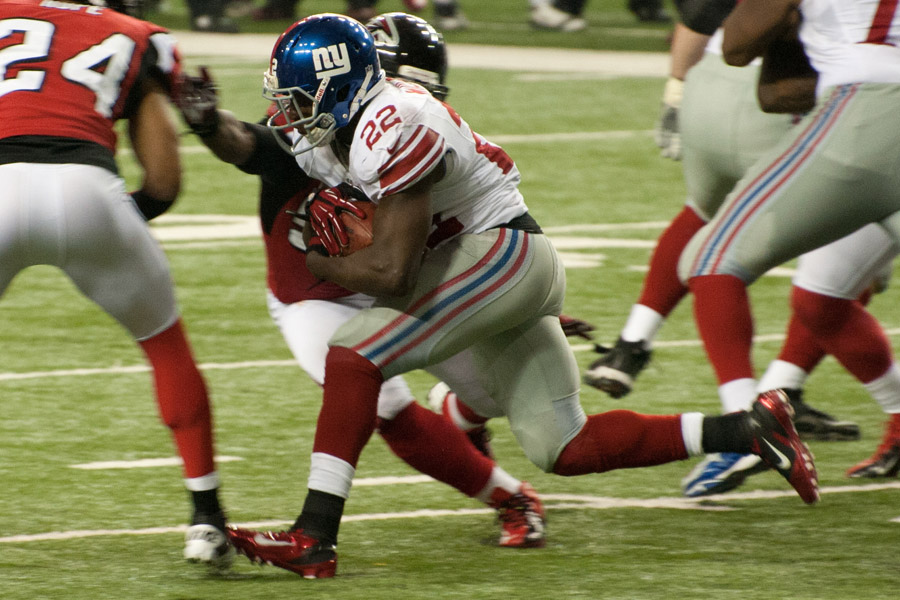
Leave at the curb? Wait a few more miles? Ride or die? Which call should you make with these worrisome players? Matt Waldman scouts the fantasy football landscape at the season’s quarter pole.
Stranded With Bramel: A true Story
This week’s Gut Check begins with a true story (except for one name change – and it’s not the car) that may not seem like it has anything to do with fantasy football, but I promise it does. Stay with me here. It will all be clear soon enough.
Whether it’s a new destination or an old familiar place, there’s nothing more fun than a road trip with friends. Even a familiar journey can present the unexpected. Sometimes these unforeseen events will force its traveler’s to make difficult choices. Take this year’s Senior Bowl trip with Jene Bramel.
Last January was the good doctor’s second trip to Mobile, Alabama to cover the all-star game’s practices with me and Cecil Lammey for the New York Times, the Rookie Scouting Portfolio, and Lammey’s ESPN affiliate. Usually, I pick up everyone at the Atlanta airport and I drive the team to Mobile. Lammey had to make other plans this year so it was Jene and I making the drive.
I’ve been chauffeuring the crew to Mobile and around town for the past five years. Despite odd stories like late-night scavenger hunts for reliable wireless that once led us to an empty Hooter’s parking lot after hours just to file those New York Times practice reports, it has always been an easy gig to be the driver. Even so I had the feeling I should consider renting an SUV last year.
The reason is that I bought a used Prius six months earlier. It works great around town and I even drove it to Memphis without issue on a summer trip with Alicia. However, it’s the Tashard Choice of cars: It’s small, it lacks acceleration, and no one’s really comfortable with the idea of having it carry the offense.
My particular Prius also has two quirks. One is that it has a name. Alicia likes to name machines. I think it’s a backwoods way of respecting the tools you’re fortunate to acquire. We call him Pete.
Pete’s other quirk is his gas gauge. While it’s cool that he gets me 46-50 miles to the gallon on a routine basis, Pete’s gauge doesn’t make a gradual drop from full to empty as you drive him. Instead, Pete will act like he still has a full tank for at least 500 miles. Then with 3-5 miles of gas left in the tank, he drops the gauge to one square above empty.
Imagine Tashard Choice getting 20 touches, looking like he’s capable of 25 more, and at touch number 22 he has a narcoleptic episode just as the ball arrives during the exchange on a toss sweep. While I knew Pete’s gauge wasn’t reliable, I track the odometer well enough to hit the gas station with at least 25-30 miles to spare. But on this Sunday afternoon in the middle of Alabama countryside, Pete conked out on Bamel and me two miles from the nearest exit.
Lot’s of decisions to make at this point: Call USAA? Call a wrecker? Walk to the exit? Go together?
My decision? Leave the northern guy in the deep south on the side of the road (sorry, Jen) to watch the car while I take off running for the exit. A quarter-mile down the road, a car with a trailer pulls to the shoulder waiting for me, windows open, blaring Styx’s “Renegade”.
Countryside. Car out of gas. Stranger offering ride in vehicle blaring song about impending death. It’s a cliche moment of a horror flick.
“I saw your car by the side of the road do you need a ride?” shouts the man over the music. He’s no more than five years older than I am, fit, weekend stubble, looks a little nervous as he’s also sizing me up. Good sign. Another good sign? A sudden wave of panic registers across his face when he realizes that not only is the radio still on, but he’s about to offer a ride to a stranger with Hangman coming down from the gallows and I don’t have very long blasting from his speakers.
“Yep. Ran out of gas. I just need to get to the next exit. What’s your name?” I ask as he tells me his name is Rick. My brain is saying this isn’t a good idea, but my gut is telling me everything’s cool. Still my brain needs a hedge. “Yeah, we’re on assignment with the New York Times for the Senior Bowl in Mobile. They’re expecting us to meet the rest of the team and file a report tonight. What do you do, Rick?”
Rick’s face softens a bit and he looks more relaxed. Meanwhile my cell phone is buzzing in my pocket.
“The Senior Bowl, huh? Good deal. I’m an ER nurse,” Rick says, explaining that it’s his day off and he’s getting ready to do some work on the house. “Was just coming back from Lowe’s when I spotted your car and your friend on the side of the road.”
I get in the car and five minutes later we’re at the only gas station in a 10-15 mile radius and they don’t have a gas canister. I buy two large jugs of distilled water, empty them in front of the gas pump, fill them with fuel in front of the state trooper who does nothing, and we head back for the car. However, we have to drive another three miles past the car because his trailer won’t navigate the median on a U-Turn.
This of course elicits another round of cell phone buzzing as we pass Bramel sitting in the sun with his iPad in the grass as he watches us pass him. We make it to Pete. I introduce the doc to the nurse, they talk shop as I fill the car and make sure it starts, we thank Rick, and we’re on our way.
In the car and on our way, Bramel and I have a few realizations. First, I’m an idiot. Not only do I leave Bramel stranded roadside without a key to the car when we have a chance to call USAA and perhaps have to wait a half-hour longer for a ride to the gas station, but I risk never being seen again after entering a car that’s too far away for Bramel to make out.
Second, I at least had some shred of common sense to invoke our affiliation with the world’s most recognized newspaper so our driver is on notice that we’ll be missed if we go missing. Third, I luck out that the driver is a good guy; an ER nurse who was equally unsure about offering a ride to a 40-something dude with a five days of scruff and sporting sunglasses and a Beast Mode t-shirt.
What does this have to do with worrisome players? First, most of you have at least one player making you feel like an idiot after the first three weeks of the season. Second, you at least have some shred of common sense or intuition about how to handle it. Third, you lucked out that I’m not playing Renegade as I write this article.
Fourth, you need to figure out if each player in this week’s Gut Check is someone you should leave at the curb, hang in there for a few more miles, or decide you’re going to ride or die with them. I’m stating my case for each but remember I’m the same guy ran out of gas in a Prius, left Jene Bramel stranded, didn’t answer my cell phone, and took a ride from a stranger.
Of course, I’m here to tell you about it which should tell you I’m either good or I’m lucky. At this point, does it matter which one it is? I didn’t think so. Let’s get started.
Leave At the Curb: Too Risky
RB Stevan Ridley: It’s not the 3.4 yards per carry or the ball security issues that have me worried about Ridley. He’s still a tough runner with burst. It’s the one reception for eight yards in three games versus Brandon Bolden‘s five catches in one week. The Patriots don’t use him in the passing game. Bolden’s 49 yards on 5 receptions is just 2 yards and 1 reception fewer than Ridley’s 2012 receiving total.
Granted, Ridley was the No.10 fantasy runner last year with that paltry total. However, Bolden ate into Ridley’s time when he was healthy last year and Vereen also battled health issues.





